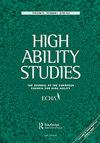天才教育研究的多学科视角和领域强化问题
IF 1.8
4区 教育学
Q2 EDUCATION, SPECIAL
引用次数: 0
摘要
考虑多学科的观点作为一个镜头,通过它来看待资优教育研究。本着那些寻求提出领域强化问题以帮助促进科学进步的学者的精神,我们解决了四个问题,并鼓励所有学科的其他学者提出他们自己的问题:如果这个领域比我们想象的要大得多呢?2. 如果这个领域的智力多样性没有我们想象的那么多呢?3.如果支持天才编程效果的证据并不像我们想象的那么有力呢?和4。如果有天赋的学习者即使没有完全被挑战,也可能真的很好呢?在回顾了支持(和不支持)这些问题背后的核心思想的证据之后(以美国为重点,针对更多学术领域的学术天赋学生),我们总结了继续提出领域强化问题以改进研究的想法。我们应该从天才之外的学科中探索问题、想法和已确立的发现,并尝试通过多种方法和学科视角,从其他接近知识的方式中学习,使天才成为一个更加多学科的领域。本文章由计算机程序翻译,如有差异,请以英文原文为准。
Multidisciplinary perspectives and field strengthening questions for gifted education research
ABSTRACT Considers multidisciplinary perspectives as a lens through which to view gifted education research. In the spirit of scholars who have also sought to ask field strengthening questions to help improve scientific advance, we address four questions and encourage other scholars from all disciplines to ask their own questions: 1. What if the field is much larger than we think it is? 2. What if the field is less intellectually diverse than we think it is? 3. What if the evidence supporting the efficacy of gifted programming is not as strong as we think it is? and 4. What if gifted learners may actually be okay even if they are not fully challenged? After reviewing evidence supporting (and failing to support) the core idea behind each of these questions (with a U. S. focus and for academically-gifted students in more academic domains) we conclude with ideas about continuing to ask field strengthening questions to improve research. We should explore questions and ideas and established findings from disciplines outside gifted and try to make gifted a more multidisciplinary field by being open to learning from other ways of approaching knowledge through a plurality of methods and disciplinary perspectives.
求助全文
通过发布文献求助,成功后即可免费获取论文全文。
去求助
来源期刊

High Ability Studies
Multiple-
CiteScore
4.80
自引率
11.10%
发文量
7
期刊介绍:
High Ability Studies provides a forum for scholars in a variety of disciplines associated with the development of human abilities to their highest level. It is a medium for the promotion of high ability, whether through the communication of scientific research, theory, or the exchange of practical experience and ideas. The contents of this journal are unique in reflecting concerns and recent developments in this area from childhood and across the whole life span in a variety of contexts. Far from being restricted to the traditional focus on high-level cognitive development, it also presents investigations into all other areas of human endeavour, including sport, technology, the arts, business, management and social relations.
 求助内容:
求助内容: 应助结果提醒方式:
应助结果提醒方式:


